Vive Les Blemishes! |
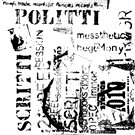
|
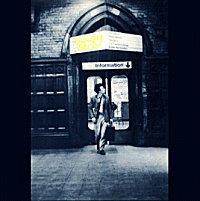
| Metal Urbain, Blue Orchids, Jonathan Richman, Vic Godard and Subway Sect, Pere Ubu, Augusto Pablo, The Fall, Raincoats, Slits, Pop Group, This Heat, Feelies, Swell Maps, Stiff Little Fingers, Cabaret Voltaire, Robert Wyatt, James Blood Ulmer, Arthur Russell, A R Kane, Wire, Young Marble Giants, Monochrome Set, Kleenex, Essential Logic, Delta 5, Prats, Electric Eels, Aztec Camera, TV Personalities, Panther Burns, Sudden Sway, Go-Betweens, Weekend, The Gist, Red Krayola, Protex, Opal, Nightingales, Scritti Politti and The Smiths. Now, if my memory serves me well, all those names at one time or another had recordings released by Rough Trade, and that is an incredible track record for any label. Significantly, the best of this list had records put out on Rough Trade between 1978 and 1983. If you were to collate a list of the first 50 singles put out by Rough Trade, I would aver that any label would be hard pressed to impress me more. There is such an incredible mix of inventiveness and edginess. Yet, Rough Trade, either then or now, rarely receives credit for what it achieved. I shall put my hands up and confess that I am as guilty as anyone of this. back in the days, in the initial rush and roar of the independent labels energised by the punk explosion, Rough Trade did not have the glamour or the aura of a Postcard, Zoo, Ze, Fast, Fetish or even Factory, so my passionate support went AWOL. Looking back at notes I made when writing an abandoned treatise on Postcard and its satellites, I dismiss Rough Trade for its hippy connotations, and the pervasive image of collectivism and laid back liberalism. There genuinely was an image of Rough Trade people sitting around in a Ladbroke Grove flat, in sandals and shaggy jumpers, eating lentils and brown rice, when they should have been out there tearing down walls. Probably true and probably very unfair and irrelevant. The fact remains they achieved so much, and I have to keep saying the track record speaks for itself. |
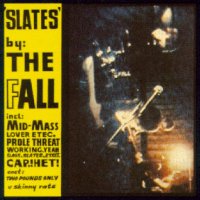
|
The reason I have to keep saying that is because it seems impossible to buy much of the Rough Trade back catalogue now. The CD archivists have not been kind to Rough Trade. I don't know if this is all to do with the label going broke and losing rights to its past, but an awful lot of great music remains frustratingly unavailable on CD at least. For example, the Blue Orchids Greatest Hit, Pop Group's We Are Time, the Delta 5 singles, Weekend outings, Opal, the early Scritti scratchy sounds. Where records have resurfaced, they are scattered all over the place, and the link with Rough Trade can be overlooked. Let's just reflect on a few of those records; the Robert Wyatt EPs collated by Rykodisc, the Pere Ubu LPs available again on Cooking Vinyl, Slates by The Fall on Castle, Wire's Document and Eyewitness on Mute's Grey Area, and I guess you see the scale of what Rough Trade contributed to pop culture. Knowing that Geoff Travis is still fairly high profile in the music industry (managing Pulp?) it is infuriating that there is so little control over the Rough Trade heritage. That, in some ways has been the Rough Trade way. It would be good to see someone curate the label's archives in the way Ace has done with Stax. A Rough Trade singles box set is something I would kill for. Similarly, someone should have put together some of the doubtlessly great stories that must be around, particularly of the late '70s/early '80s era where the abiding image of the label seems to be the comradeship and exchange of ideas and the completely natural sense that the label should be led by the femme-centric Raincoats, Delta 5, Essential Logic, Kleenex, Slits unique take on pop. It was never an issue at the time, but seems surprising in retrospect. I guess it all worked because unlike other adventurous independent labels, Rough Trade was not dominated by an all-pervasive ego like Postcard with Alan Horne, Factory with Tony Wilson, Zoo with Drummond and Balfe, Fast with Bob Last. To put it in perspective, Rough Trade as a label grew out of the Notting Hill shop which in turn evolved from being in the mid '70s a reggae outlet to being a punk focal point and then in turn a label for left field alchemy. The shop itself remains, together with its Covent Garden sister, a London institution. I have not been to the Notting Hill shop in years, but I cannot speak highly enough of the staff's kindness in helping offload copies of various fanzines I produced during the '80s. By their providing an outlet, I made contacts with people I love dearly to this day. Indeed the shops have special places in pop history with the traditions of free live shows, started in the mid '80s with the Jasmine Minks and June Brides, and more recently I treasure seeing the Sea and Cake, DJ Shadow and To Rococo Rot perform there in one way or another. There is also the Notting Hill shops place in the Go-Betweens/Postcard story, but that is a tale for another day. |
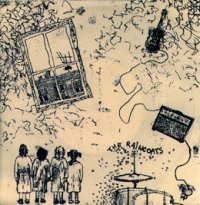
| From my own dabblings in the music world, I realise that Rough Trade must have been treading a fine line financially throughout its heyday. Having said that, even early releases like 'Ambition' by Subway Sect probably sold enough to secure a respectable chart place in today's market place. That's not the point. The booklet accompanying the reissue of the Go-Betweens' Springhill Fair highlights how the label had all sorts of financial difficulties in 1984, even after releasing such classic LPs as The Fall's Perverted By Language and the Go-Betweens' Before Hollywood. I guess that explains what was at the time a nightmarish delay to the release of the Subway Sect retrospective, featuring the legendary Peel sessions. By the mid '80s The Smiths dominated the Rough Trade landscape, and I have trouble remembering much of what then came out on the label. From being a very vocal advocate of The Smiths early on (I still treasure my notes from Morrissey), I soon lost patience and actively hated the Marr man. So, Rough Trade did not become the pop art Motown Alan McGee envisaged in 1983, but it still had its moments. I don't think the label's leading light Geoff Travis' involvement with Blanco Y Negro helped, and I suppose the realities of the market place took their toll. Looking back, like a First Division side, they produced a talent pool for the major players to snap up. The irony being that it's hard to think of anyone, from the Delta 5 to Stiff Little Fingers ro Aztec Camera to Scritti Politti to The Fall to Protex to the TV Personalities to the Go-Betweens to Cabaret Voltaire to The Smiths, who moved on to better things or made better records. In fact, Rough Trade provided an occasional haven for wayward souls like Vic Godard. His Subway Sect put out their most well loved moment, 'Ambition' as one of the label's first releases. I saw a dire Vic Godard fanzine recently, saved by an awesome interview with Rob Simmons, original Subway Sect guitarist, which thankfully reinforces my reverence for the man (at least he has not turned into a punk rock pub singer stretching his status ever more and more) with lots of anecdotes about how the group evolved, and how they hated the 'Ambition' single because it was too rock! |
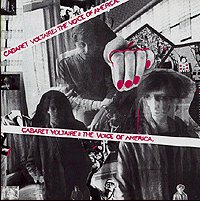
| Anyway, I would argue that, apart from the Fall, and the TV Personalities' 'Look Back In Anger' and 'La Grande Illusion', my own special Rough Trade moments now come from Cabaret Voltaire. The series of records they out on the label has been made available again by Mute's Grey Area (and under a recent promotion you could get three CDs for £25!) and any one is highly recommended. Perhaps the best place to start is the Living Legends compilation that collects together singles tracks and other oddities. Again, I have to confess that I have a lot more time now for the Cabs than I did way back when. Again, part of the image problem of the label, or does the benefit of hindsight make their music more accessible and vital? Reading in Jon Savage's Time Trial collection of writings an old '78 Cabs interview and listening to their music, you get the sense of how far ahead they were in picking up new electronics, dub reggae, Krautrock and the Velvets, modern composers and audio collage techniques. What is also striking is how untrue is the cold Sheffield synth myth, as the music is surprisingly song and guitar driven at times, like the '79 'Silent Command' single and 'Jazz The Glass' from 1981 towards the end of their Rough Trade innings which even has a Northern Soul twisted foundation. I guess you have to mention 'Nag Nag Nag', a true punk roar of defiance and deviance, perhaps matched only by A Certain ratio very early on with 'The Thin Boys' or the flip of 'All Night Party' and the studio tracks on The Graveyard And The Ballroom like the awesome 'Flight' and the disconcerting 'Crippled Child'. I would rather point you in the direction of what I consider to be the two great Cabaret Voltaire LPs, Voice Of Modern America and Red Mecca. The latter shows a move towards the urban funk that would so inform later Cabs moves (and in turn inspire a new generation of electronic activists and Warp-ed kindred spirits). The beautiful sleeve comes courtesy of Neville Brody, who was defining the spirit of the age with his work in The Face (when it was still a great POP magazine) and for labels like Fetish and odd projects like Defunkt's totally phenomenal 'Razor's Edge' 12". Speaking of Fetish and Neville Brody's sleeves, when will someone salvage all the 23 Skidoo releases? |
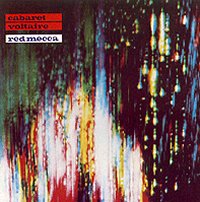
| Anyway, I digress. Red Mecca saw Paul Morley desperately trying to redefine the Cabs in The Face with a new, hip user-friendly persona. That was fair enough, the 'Seconds Too Late' single from '81 should have been a hit, and you can understand why the Cabs and others like the Delta 5 were getting restless. I suppose these days a modern equivalent of Rough Trade would have an army of advisers and image consultants on board to promote the right angles and airbrush out the blemishes even at an early stage. Ah, but it was those blemishes that ultimately mean Rough Trade's heritage is worth so much now. © Kevin Pearce 2000 |